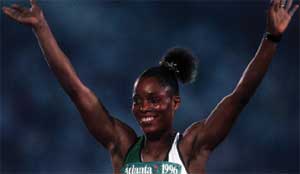Chioma Ajunwa-Opara’s story is the stuff fairy tales are made of. After various set-backs in her career, the Ahiazu Mbaise, Imo State-born athlete finally achieved fame at Atlanta ’96 when she became the first Nigerian to win an Olympics gold medal. To date, she remains Nigeria’s only individual Olympic gold medalist.
Chioma Ajunwa-Opara
Popularly known as Chioma Ajunwa, her moment of glory came on Friday, August 2, 1996. She sprinted down the long jump runway and took off after a few metres. When she landed in the sand pit a couple of seconds later, she had catapulted herself into folklore. Her amazing first round leap of 7.12 metres won her the women’s long jump event at the Olympic Games.
Eighteen years after that historic feat, the diminutive athlete now calls the shots at the Meiran Police Station, Agege, Lagos, where she is the Divisional Police Officer (DPO). Getting her for an interview is a very difficult task, as she is either attending to her colleagues in the station or dealing with one security issue or another in the area.
TheNiche went to her duty post recently, and after a long wait, she finally managed to open up on her experience at the Atlanta 1996 Olympics and other things. As she had done in the past, Ajunwa reiterated that she never thought of winning any medal at the Olympics, let alone gold; but had to thank God for the feat, as it was the Lord’s doing.
She said: “Till date, it is still a miracle to me. I never thought of it, and many did not want me to win it; but to God be the glory.
“After I took the leap, it took sometime before the officials could raise the white flag. Then as I was walking back, looking back to see the board rotate because once it starts rotating, it means the jump has been given to you.
“I noticed one Mr. John from Kenya very curious about the jump and I saw officials discussing among themselves, but I couldn’t hear what they were saying. Eventually, they raised the flag and the board started rotating.
“At that moment, I didn’t see anybody to hug because I was the only Nigerian there; as a matter of fact, the only African. So, what I did was go on my knees and bowed to God. It was thereafter while on a training tour in Kenya that I met that same Mr. John who then revealed to me that the officials wanted to rob me. When they discovered that the jump could be a winning one, they wanted to rob me of it, but he told them that if they did, he would expose them; they didn’t have any choice but to raise the flag.”
She expressed disappointments in the officials of the Athletic Federation of Nigeria (AFN) and the government delegation for down-playing her chances of winning a medal at the Olympics, as there was no one to give her support during her event.
“When my colleagues, Mary Onyali and Falilat Ogunkoya, won their medals, the then Minister of Sports, Jim Nwobodo, came to our camp with his entourage and gave money to the winners as well as pep talks to other athletes that were yet to have their events,” she said.
Going further, she revealed: “They called them by names and promised them goodies if they won. As they got up to go, a colleague, a hurdler who was also a Law student then, got angry and asked the minister why he did not mention my name while talking to those that were yet to do their own event, if my own event was not important. The minister then said, I should go and win first.”
At that point, she was sad and started crying, as if her event was not important while her other colleagues were encouraging her to go for the event and do her best.
To discourage her more, Ajunwa, Beatrice Otondu and May Tonbiri went to the Nigerian house on her competition day to collect the national flag that she would use after winning. But they were denied the flag.
She said: “Otondu asked for the flag that I was going to use for the victory lap, but the official we met at the place laughed at us and urged us to go for the event, that he alongside others would come for the event with the flag, which they never did.
“We knew they were all going to watch football match and so we left without getting the flag. When God did the miracle, it shocked every one of them. And after I won, there was no flag to celebrate. I had to use a flag that someone in the crowd threw at me for the victory lap.
“That is to tell you that they never believed anything good would come from the long jump event, but I thank God for His mercies.”
She also faulted the welfare package from the government that followed her gold medal performance. It was not all gloom though, as the feat came with its blessing.
“In terms of doors, it did open doors for me and it made everybody know me and also helped me rise through the rank as a police officer. But apart from that, there was nothing to show for it.
“Had it been it was another country that I won the first individual Olympic gold medal for, I would get cars and houses. But Nigeria gave me just N1 million, and in bits. I never knew what I used it for.
“What is the meaning of being given Member of the Order of the Niger (MON)? MON was given to everybody that went for the games. The players that won the Nations Cup in 1980 were all given houses in FESTAC. Is there any street named after Chioma Ajunwa in Abuja? Nowhere! I thought MON comes with money, apart from the certificate and presidential handshake,” she said.
She has set up the Chioma Ajunwa Foundation (CAJ) to educate sports men and women in Nigeria on the dangers of using banned and illegal substances – a struggle she had to overcome after her 1992 four years suspension for failing drug test. Now she uses her remarkable story to help other Nigerian athletes by holding drug awareness campaigns in the country.
“I don’t want them to go through what I have gone through. I want to let them know that buying things in supermarket is very dangerous.
“And if intentionally they buy anything that they know is a banned substance, and they are caught, that is the end of it. So that is why I took it upon myself to come and start educating them, going from one competition venue to another,” she said.
Ajunwa-Opara also mentors young Nigerian athletes for a better future in competitive sport, as she doesn’t want to be the only individual gold medalist in the country.
Her life has been nothing short of miracle. She originally played football for the Nigerian women’s team and was a member of The Falcons during the Women’s World Cup in 1991. But she was constantly benched.
Of her short-lived football career, she stated: “I’ve not regretted the decision (to leave football) because I’ve made my mark in athletics. I could have continued with football, but there was a particular coach who knew then that I was the best player in the team, but decided to keep me on the bench throughout our matches. So I left the team’s camp.”
She, however, did not hide God’s blessing on her, and confessed that God has been good to her and her family.
She urged people to join her to glorify God, especially for the birth of triplets in 2012, which she described as a ‘miracle’ after she married Mr. Okpara, the pastor in charge of Chapel of Destiny Restoration Church, Lagos, sometime in 2004.
“I never knew I was pregnant until it got to the seventh month. And like at Atlanta ’96, it was a miracle and not by my power.
“When I was pregnant, I asked God for so many things; the number one thing was that if this should become a reality, I promised God I would return the children to Him and give a giant offering.
“To God be the Glory, it came to pass. My babies are two boys and a girl: Joshua, Caleb and Rose,” she said.













